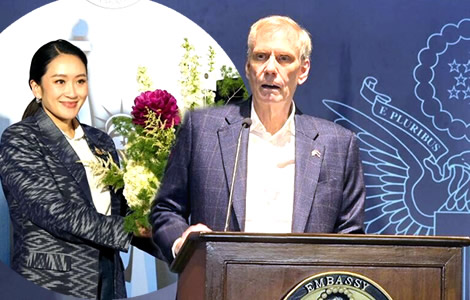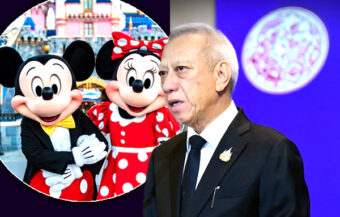Under fire at home, PM Paetongtarn looks to US trade talks for a vital economic and political lifeline. As growth slows and dissent brews, her high-profile appearance at the US Independence Day event signals a bold bid to boost ties and secure much-needed momentum.
Under mounting political pressure, Prime Minister Paetongtarn Shinawatra still made time Wednesday to mark U.S. Independence Day in Samut Prakan, standing alongside senior ministers at a high-profile diplomatic event. The ceremony came as Thailand opened crucial trade talks with Washington. U.S. Ambassador Robert F. Godec struck an optimistic tone, offering support as both nations look to reshape their economic ties. Back in Bangkok, the Bank of Thailand held interest rates at 1.75% but warned of gathering economic headwinds. Growth forecasts for 2026 were slashed to just 1.7%. With her government on shaky ground, Paetongtarn is betting big on the U.S.-Thai trade talks. A breakthrough could deliver the economic lifeline her administration desperately needs.

On Wednesday, U.S. Ambassador to Thailand Robert F. Godec expressed hope for a favourable outcome in U.S.-Thai trade talks. He made the remarks during a ceremony celebrating the 249th anniversary of American independence. The event was held at Topgolf Megacity in Samut Prakan Province, just outside Bangkok.
As Ambassador Godec addressed the audience, he underlined the importance of fair and balanced global trade. According to him, over 135 countries are currently in trade discussions with the United States. Thailand, he noted, is one of the key partners in this global network.
Although he declined to provide specific updates, Godec said the negotiations were underway and progressing constructively. He added that an official announcement would be made once both sides were ready. Nevertheless, his optimism suggested that the talks are nearing a critical phase.
Bank of Thailand holds rates at 1.75% as exports lift early 2025 but risks rise into next year impeding growth
The ambassador’s message comes at a pivotal time for Thailand’s economy. On the same day, the Bank of Thailand’s Monetary Policy Committee (MPC) voted to maintain the policy interest rate at 1.75%. The vote was split 6 to 1, with one member advocating a 0.25% rate cut to stimulate growth.
Importantly, the central bank reported that the Thai economy had performed better than expected during the first five months of 2025. Export growth and manufacturing activity led to this early-year surge. However, officials warned that the second half of the year could be more challenging.
In fact, the Bank of Thailand forecasts that the economy will grow by 2.3% in 2025. This is a modest figure, yet better than earlier projections. Still, growth in 2026 is expected to slow to just 1.7%. Therefore, economic uncertainty remains a serious concern.
In addition to external trade risks, domestic factors are weighing on the outlook. Private consumption is softening as income growth slows and consumer confidence dips. Moreover, tourist arrivals have declined, although per-capita spending by visitors remains stable.
Low inflation and cautious lending reinforce fragility as Thailand weighs its policy room carefully
Meanwhile, inflation remains muted. Headline inflation is expected at 0.5% in 2025, rising slightly to 0.8% in 2026. Core inflation is forecast to hover around 1.0% in both years. According to the MPC, this low inflation is driven largely by supply-side factors, not weak demand.
At the same time, credit growth is slowing. Banks remain cautious, especially with lending to SMEs and lower-income borrowers. Loan quality is deteriorating in some sectors, such as housing and small business loans. Consequently, financial institutions are tightening lending standards.
Despite these signs of fragility, the central bank decided against cutting rates further. Most members felt that previous rate reductions had already mitigated near-term risks. Furthermore, they emphasized the need for policy space amid ongoing global uncertainty.
Alongside these economic developments, the political situation in Thailand is increasingly delicate. Prime Minister Paetongtarn Shinawatra attended the U.S. event, accompanied by several key cabinet members. This included Commerce Minister Pichai Naripthaphan and Foreign Affairs Minister Maris Sangiampongsa.
Prime Minister’s presence at US event signals resolve to maintain ties despite growing political strain
The Prime Minister’s appearance was widely noted by observers. Indeed, it signalled her intent to maintain strong international ties as her administration faces mounting domestic challenges. Thailand has a history of political instability, including military coups during times of economic strain.
Her visit also had symbolic value. She presented a bouquet to Ambassador Godec and shared a cordial conversation with him. Both were seen touring the venue, exchanging views in a warm and friendly atmosphere.
Beyond trade, Ambassador Godec addressed education and security cooperation. When asked about changes to U.S. visa policies, he reaffirmed America’s openness to foreign students. He acknowledged that the Trump administration had tightened entry requirements. However, he emphasized that students from Thailand remain welcome.
Visa appointments for student and exchange programs have resumed at U.S. embassies, including in Bangkok. The ambassador advised applicants to consult embassy websites for the latest scheduling information. While national security remains a top U.S. priority, he encouraged Thai students to continue pursuing American education.
US and Thailand step up cybercrime cooperation as cross-border scam networks trigger alarm bells
Additionally, he discussed growing collaboration between the U.S. and Thailand on cybersecurity and transnational crime. Online scams have become a major problem in Southeast Asia. Many are traced back to criminal compounds in neighbouring Cambodia and also Laos.
According to Godec, both countries are committed to tackling this issue together. He pledged support for the Thai government’s recent push to suppress online crime networks. This includes collaboration across governments, private firms and civil society. Effective cooperation is essential to protect citizens, he said.
This issue has become especially urgent. Online fraud syndicates in border regions have increasingly targeted both U.S. and Thai citizens. Therefore, cross-border enforcement and intelligence-sharing are becoming central pillars of bilateral security efforts.
Returning to trade, Thailand hopes to emerge from the current negotiations with the U.S. in a stronger export position. Officials are preparing to tighten customs certifications and monitor shipping routes more carefully. The goal is to prevent Chinese goods from being rerouted through Thai ports to bypass U.S. tariffs.
Thailand seeks to lock in 10% US tariff rate by tightening customs controls and cutting concessions
This kind of compliance is expected to help preserve Thailand’s access to U.S. markets. At the moment, Thailand faces a 36% tariff on some exports under Trump-era trade measures. Meanwhile, Vietnam, which once had a 46% rate, may see its rate drop to between 20 and 25%.
Thailand, by contrast, is pushing to retain a 10% baseline rate for its U.S. exports. To secure this, the government may need to offer major concessions. These could include adjustments to its domestic tariff structure and greater openness to U.S. imports.
Such a deal could provide a much-needed boost to the Thai economy. It would also offer political benefits to the Prime Minister’s government, which is under pressure to deliver results. A favourable outcome would reinforce Thailand’s global trade standing and support key sectors like electronics and agriculture.
Notably, the first half of 2025 saw strong growth in electronic component exports. Much of this was due to accelerated shipments ahead of anticipated U.S. tariff hikes. These early gains lifted industrial output and boosted related service sectors. However, the government acknowledges that this momentum may not last.
Thailand hopes a lasting US deal will boost trade momentum and deliver urgently needed political relief
Therefore, Thailand is aiming not just to secure lower tariffs, but to build a more resilient trade framework. This includes diversifying export markets and investing in value-added industries. It also involves strengthening economic ties with key partners like the United States.
In sum, Ambassador Godec’s appearance this week highlighted the depth of the U.S.-Thailand relationship. His remarks on trade, education, and cybersecurity reflect shared interests and mutual respect. Meanwhile, the presence of the Prime Minister and top officials highlighted Thailand’s strategic priorities.
Crucial test for Prime Minister Paetongtarn on Saturday as the Yellow Shirts take to Bangkok’s streets
Finance Minister is banking on a U.S. extension of the reciprocal tariff suspension expiring on July 9
As negotiations continue, both sides face a complex set of choices. Yet the tone from Wednesday’s event was optimistic. If a comprehensive deal can be reached, it will mark a significant achievement for both governments—and potentially a turning point for the Thai economy and Ms Paetongtarn’s fortunes.
Join the Thai News forum, follow Thai Examiner on Facebook here
Receive all our stories as they come out on Telegram here
Follow Thai Examiner here
Further reading:
Prime Minister Paetongtarn pulls her government back from the brink with emotional televised apology
Government on brink of collapse as the Bhumjaithai withdraws from Paetongtarn’s cabinet over clip


















